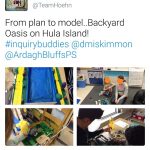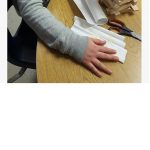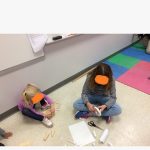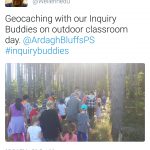Reflecting on current experience, we identified that in order for our older students to experience authentic learning from partnering with primary students, we must provide experiences for them to create and take away learning at their level along with their younger peers.
By providing materials and STEAM challenges for creative expression of knowledge and problem-solving, we will create environments where students are encouraged to “think to learn and learn to think.” These inquiries will provide students opportunities to further develop essential life skills such as collaboration and critical-thinking. Through their investigations, we believe older students will provide a rich model for problem-solving and inspiration for the younger students. We envision both sets of students will be engaged and enjoy their relationship.
Team Members
Hung-Khai Ma
Simcoe County District School Board
Justin Weller
Simcoe County District School Board
Greg Harris
Simcoe County District School Board
Desiree Miskimmon
Simcoe County District School Board
Jennifer Hoehn
Simcoe County DSB
Robin Quinn
Simcoe County DSB
Professional Learning Goals
- Developed parameters (success criteria) to help us assess progress (include students in this process)
- Created virtual and physical sharing places (e.g., Google Docs, library) to share insights, concerns, ideas
- Reflected and analyzed progress throughout process *include students (anecdotal, survey, video/photo)
Activities and Resources
Grade Kindergarten and Grade 6/7
- Students were initially given opportunities to get to know each other through group hikes to search for geocaches near the school community
- Students were then met again for STEAM challenges such as parallel bridge building. Classes used Google Hangout to share and collaborate their investigations.
Grade 3 and Grade 8
- Students were challenged to design and build a container to hold an egg as well as a parachute device that would withstand a fall of one storey
Grade 2 and Grade 7
- Students were challenged to plan and make a model of a backyard oasis with materials available around the classroom
Unexpected Challenges
- In a few instances, buddies were not able to work with another buddy (low reading skills) or they refused to (belligerent, stubborn, don’t like little kids, etc.)
- We also witnessed instances where buddies wanted to do all of the work, which effectively shut out the older/younger buddy
Enhancing Student Learning and Development
Both buddies discovered they could work with younger/older students.
This created friendly “passings” in the hall, outside and in assemblies. It seemed to have a calming effect on some of the buddies.
Some of class had the older buddies as classroom helpers and these interactions created a respectful relationship on both sides.
In the winter, the older buddies had a different recess period than the kindergarten buddies and because of this relationship, a structure (an igloo) was created by the kindergarten classes and the older buddies had maintained and helped improve the design of the igloo. Previous structures would have been torn down relatively quickly by either groups.
Sharing
- Twitter – we have tweeted out events that have happened with our inquiry buddies #inquirybuddies
- Student works are often displayed in our library. Students from other classes often comment and ask questions demonstrating their interest.
- During staff meetings, the group had an opportunity to share their collaboration and also invited other staff members in this process
Project Evaluation
Inquiry buddies changed into more of STEAM buddies, and this was fine.
The students were more engaged doing parallel activities when both age groups had challenges to complete. There wasn’t as much interest by the older buddies when they were in a supportive role because they were at times shut off/out by the younger buddies because they didn’t want help and, at times, the older buddies didn’t have much to do.
There were a number of benefits from this change:
- Both age groups were engaged because they both had a challenge to attempt
- Because the challenge was similar in scope, both buddies could talk about what they were doing in a task with commonalities. They could bounce ideas off of each other. They could ask questions of each other.
- This enabled teachers to plan for certain/specific learning and social goals
Resources Used
IQ: A Practical Guide to Inquiry-Based Learning
https://www.amazon.ca/IQ-Practical-Guide-Inquiry-Based-Learning/dp/0199009341
Resources Created
These resources will open in your browser in a new tab, or be downloaded to your computer.








